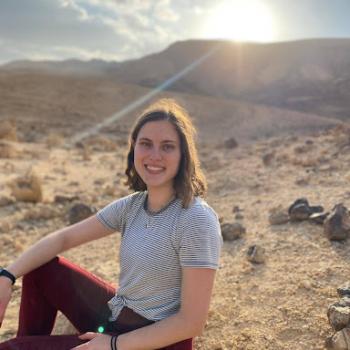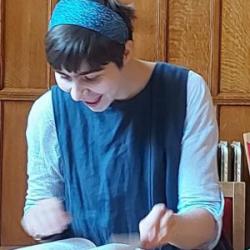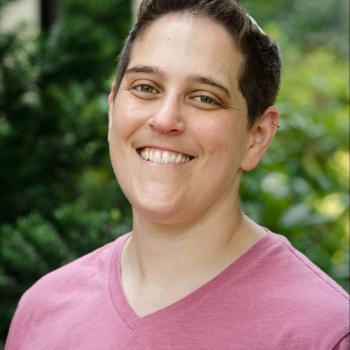By Rabbi Jim Morgan
Parashat Sh’mini (Leviticus 9:1-11:47)
Vay’hi ba-yom ha’sh’mini—And on the eighth day (Lev. 9:1): the last moment of perfection, the departure from the Eden of the seven days of Creation into the fallen world of human existence.
The first day of creation was all light, just the work of recognizing distinctions, the basis for the subsequent five days of building up a perfectly balanced world of life with no death. The week culminates in Shabbat, the seventh day, on which God and all of God’s creatures rest, ceasing their interventions: perfect balance is attained.
But on the eighth day time actually starts, death intrudes, entropy begins to rival creation, which has now become a human pursuit, a Sisyphean task, the longed-for balance always subject to the laws of gravity and human frailty. Yet we strive to maintain something of the balanced perfection of that first week, that perfection we never witnessed, which belongs exclusively to the week before we were created.
I like to imagine Aaron at the beginning of this parashah, at the end of his seven days of ordination, his work perfect only because it hasn’t started yet. Shabbat is nearly over, the moment approaching when he will need to enter the sanctuary for the first time as high priest. His apprehension mounts as the moment looms with its mystery and with the dread of making a mistake, of coming so close—perhaps too close—to the source of creation and destruction.
I recall a Shabbat lunch with a teacher of mine during rabbinical school: the melancholy that overcame him as I uncovered the kumquat tart I had brought to his home for dessert. When I inquired, he acknowledged that he had been struck with the realization that Shabbat would be over in a few hours, that the sweetness of rest would be replaced by the stress and hustle of a Saturday night flight to a teaching gig on Sunday—the eighth day looming.
Indeed the eighth day after a Jewish boy emerges from the darkness of the womb into the light of the world brings joy and fear, carries with it celebration and violence, pageantry and blood. Similarly, Aaron and his sons are plunged into the bloody work of the tabernacle with its severed limbs and fragrant offal, into the dizzying array of sacrifices, each with its own procedure and intention, into the opportunity, even the inevitability, of mistakes and their consequences.
And so it happens, just as things seem to be going well: Aaron has made his first series of offerings, all “according to regulation” and “as Moses had commanded,” (Lev. 9:16; 20) but “Now Aarons’ sons Nadab and Abihu…offered before Y-H-W-H alien fire…” (Lev. 10:1). The result is catastrophic: divine fire, dead children, and a bereaved father reduced to silence. The Torah offers hints at a reason for this result. Immediately after the deaths comes the injunction that priests should not drink as they serve (Lev. 10:8-11). Earlier, Nadav and Abihu were among the Israelites who “saw the God of Israel” on Mt. Sinai (Ex. 24:10) and thus were perhaps marked for destruction, even if not immediately. There is, however, no explicit explanation for the disaster, so we are left with dread, even as we know that we must, collectively and individually, strive to enter God’s sanctuary, the fullness of life, the uncontrollable excess of joy and pain.
And perhaps this is why God tells Aaron directly, rather than through Moses, about the temptation of numbing oneself with alcohol, of the urge to resist engaging with the full intensity of the world, to confuse the retreat into drunkenness with a retreat into rest. With alcohol, the Torah seems to say, true engagement becomes impossible, the potential for misalignment, for disconnection, for random violence will overwhelm the work. In this context, I resonate with the Islamic prohibition against alcohol for everyone: we must never numb ourselves from the reality of God’s presence.
In Biblical religion, the injunction against alcohol goes only to Aaron and his sons, the priests, those serving in God’s sanctuary. Yet in the wake of the destruction of the Temple, the Rabbis of our tradition developed a form of Judaism that focuses on the recollection of priestly service, the statutory prayers link to the daily and holiday sacrifices, each person becoming a kind of priest in the mikdash me’at (miniature sanctuary) of their own home and, even more abstractly, of their own prayer life. In recent weeks, I have been learning Netivot Shalom (Paths of Peace) in chevruta (with study partners) and have fastened upon the way R. Shalom Noach extends this rabbinic idea, encouraging us to make a sanctuary for God within ourselves, to keep the holy fire burning in our souls at all times. In this conception, we are all Aaron, understandably apprehensive about fulfilling the role God has given us, tempted to numb ourselves with whatever substance or distraction comes to hand, and too often reduced to horror, silent or otherwise, when some beloved part of ourselves comes to grief for reasons we can only vaguely grasp.
Yet unlike the first day, which comes only once, the eighth day comes again and again, every week providing us with a seventh day on which we can rest and an eighth, a renewed opportunity to serve our creator and to remake our broken world.
A 2008 graduate of Hebrew College’s Rabbinical School, Rabbi Jim Morgan’s primary role is Community Rabbi and Chaplain at Center Communities of Brookline, a Supportive Housing Community of Hebrew SeniorLife. In addition, he serves as the Russian-speaking chaplain at Hebrew Rehabilitation Center in Roslindale. Finally, he is Rabbinic Advisor for the Worship and Study Minyan at Harvard Hillel in Cambridge, a pluralistic, lay-led congregation that serves the university and the larger community.

















